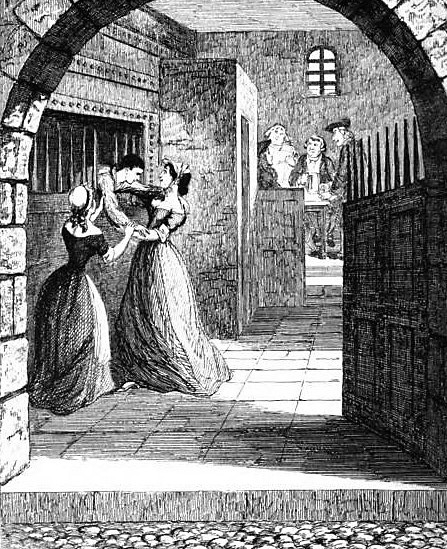The phrase Hamlet without the Prince (of Denmark) denotes an event or occasion at which the expected principal participant is not present. It is based on the absurdity of performing, without an actor playing the title role, The Tragedy of Hamlet, Prince of Denmark (between 1599 and 1602), by the English playwright and poet William Shakespeare (1564-1616).
—Cf. also the phrases Lear without the King/Henry V without the King, and Waiting for Godot without Godot.
The phrase Hamlet without the Prince (of Denmark) apparently originated in a theatrical incident which allegedly occurred in the summer of 1775 and was recounted in September of that year, for example in The Caledonian Mercury (Edinburgh, Scotland) on the 27th:
LONDON.
Covent Garden theatre opened last night for the first time this season, with a new prelude, the Suspicious Husband, and the Padlock. In the Prelude, the curtain rising, discovered the different performers of the theatre, comparing notes together on their various successes, cast of parts, droll accidents, &c. &c. which they experienced during their different summer excursions:—Mattocks gives an account of the sailors levelling their great guns at the Liverpool theatre; when Dunstall humorously replies, “they would point them much truer at a Frenchman or Spaniard.”—Lee Lewis diverts them with the manner of their performing Hamlet in a company that he belonged to, when the hero who was to play the principal character had absconded with an innkeeper’s daughter; and that when he came forward to give out the play, he added, “the part of Hamlet to be left out, for that night.”
I have found an early mention of this—or of a similar—anecdote in Saunders’s News-Letter, and Daily Advertiser (Dublin, Ireland) of 10th February 1785, which transcribed the debates that had taken place in the House of Commons the previous day:
Mr. Brownlow was for the motion.
Major Doyle also declared himself for it, and said he had heard from many competent persons out of doors, that the propositions contained every thing but what they wanted. One man observed upon the occasion, that it reminded him of having in a country town seen the tragedy of Hamlet advertised with the part of Hamlet left out.
The English poet George Gordon Byron (1788-1824) mentioned such an anecdote in a letter to the Scottish publisher John Murray (1778-1843):
(1833 edition)
Venice, Aug. 26, 1818.
You may go on with your edition, without calculating on the Memoir, which I shall not publish at present. It is nearly finished, but will be too long; and there are so many things, which, out of regard to the living, cannot be mentioned, that I have written with too much detail of that which interested me least; so that my autobiographical Essay would resemble the tragedy of Hamlet at the country theatre, recited ‘with the part of Hamlet left out by particular desire.’ I shall keep it among my papers; it will be a kind of guide-post in case of death, and prevent some of the lies which would otherwise be told, and destroy some which have been told already.
The earliest instance of the phrase itself recorded in the Oxford English Dictionary (2nd edition – 1989) dates from 1902, but I have found one, albeit in a theatrical context, in the Morning Advertiser (London) of 12th November 1810:
We hope to see Pope resume his part soon of Henry the Eighth, in Covent Garden, which he made certainly the most prominent part in the drama. The performing the tragedy without a good Harry, is like acting the play of Hamlet without the Prince of Denmark!
The second-earliest instance that I have found is from the review in The Public Ledger (London) of 9th July 1835 of “Stanfield’s Coast Scenery. Part 2.—Smith, Elder, and Co.”:
This second specimen of Mr. Stanfield’s series of English and Continental Views is in the same spirit of excellence that characterized the opening part. Domestic and foreign coast-scenery are here delineated with masterly effect. […] Britany (J. Cousen), in the single effect of the solitary old windmill, is as picturesque as any—though of Britany itself the view affords us not the least notion. It is the play of Hamlet, without the Prince of Denmark.
A variant of the second part of phrase is without Hamlet. For example, The Morning Post (London) of 4th September 1839 published the following review of Jack Sheppard, a historical novel by William Harrison Ainsworth (1805-82), illustrated by George Cruikshank (1792-1878) and serialised in Bentley’s Miscellany (London):
“Jack Sheppard” continues, and wild and improbable adventures are still crowded into his career by the author with startling rapidity and effect. The most striking part of the story, however, lies in the two illustrations by Cruikshank, which are full of power. We cannot help saying that “Jack Sheppard” without Cruikshank would be the play without Hamlet.
Jack Sheppard escaping from the condemned hold in Newgate
illustration by George Cruikshank – Bentley’s Miscellany – September 1839

Other words or phrases of theatrical origin:
to be decent (sufficiently clothed to see visitors)
malapropism
claptrap
cloak-and-dagger
Mrs Grundy
Paul Pry
Mummerset
simon-pure
fedora
Box and Cox
slapstick
old chestnut
to play to the gallery
to steal someone’s thunder
bums on seats
